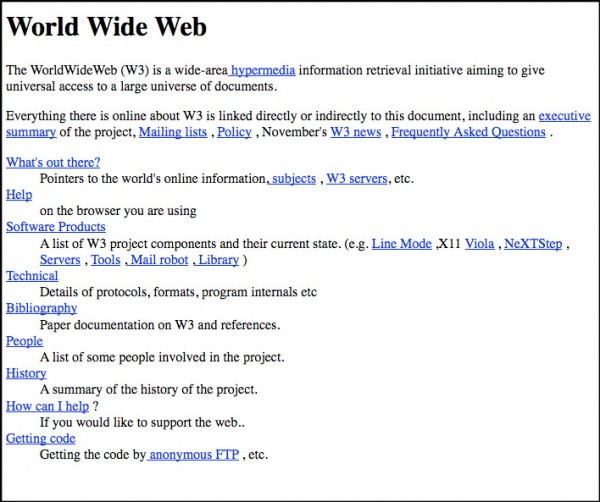Long Live The Web – But Don’t Get Stuck In 1991
Nov 19th, 2010 | By James Lewin | Category: General 
Tim Berners-Lee, who created the World Wide Web in 1991, has published an impassioned article in Scientific American, arguing that the Web needs defending:
The Web as we know it is being threatened in different ways. Some of its most successful inhabitants have begun to chip away at its principles. Large social-networking sites are walling off information posted by their users from the rest of the Web. Wireless Internet providers are being tempted to slow traffic to sites with which they have not made deals. Governments—totalitarian and democratic alike—are monitoring people’s online habits, endangering important human rights.
If we, the Web’s users, allow these and other trends to proceed unchecked, the Web could be broken into fragmented islands. We could lose the freedom to connect with whichever Web sites we want. The ill effects could extend to smartphones and pads, which are also portals to the extensive information that the Web provides.
Berners-Lee goes on to lump FaceBook and iTunes in with China as some of the top threats to the future of the Web. He’s concerned that sites like FaceBook collect user data and that can be inaccessible to the general Web. He’s concerned that iTunes uses addresses that start with “itunes” instead of ‘http”, so that iTunes is not part of the Web.
While Berners-Lee’s intentions are good and he makes many excellent points in his article, railing against FaceBook and iTunes, two of the most popular Internet-based apps of all time, is misguided.
 The Web has succeeded precisely because there isn’t a King of the Web decreeing what can and can’t be done. If there were, it would probably still look like the original Web page, above.
The Web has succeeded precisely because there isn’t a King of the Web decreeing what can and can’t be done. If there were, it would probably still look like the original Web page, above.
Progress can’t wait around for a committee to create a standard. Flash became a de facto Web standard for a decade, because it did things that HTML is just now catching up with. And iTunes succeeded where many Web-based services failed because Apple conceived of it, not as a Web application, but as a fast, Internet-enabled desktop application.
Trying to shoehorn everything into HTML and the Web stifles innovation.
When Steve Jobs introduced the iPhone in January of 2007, one of the biggest criticisms was that developers couldn’t create apps for it – it only supported Web-based HTML apps. People tried creating HTML iPhone apps, and they were slow and horrible. But, when Apple responded to the criticism and opened up the iPhone as a platform, it led to an amazing explosion of innovation.
We can’t take the World Wide Web for granted, and as Berners-Lee argues, we need to protect it from countries and companies that want to compromise it. But we can’t let the desire to preserve the Web as it is to get in the way of building the future.